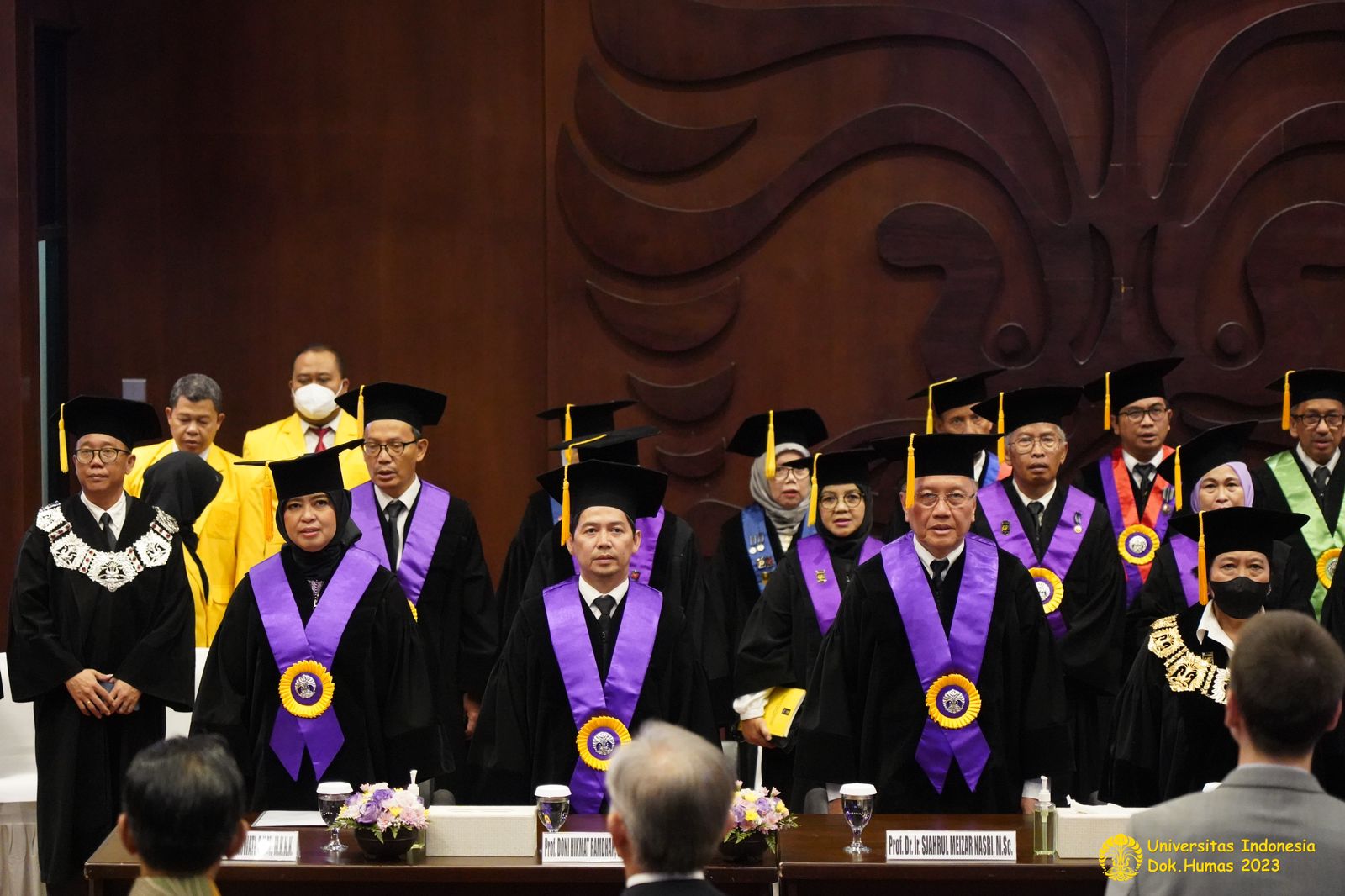
Universitas Indonesia, inaugurated 3 (three) Permanent Professors in the Field of Occupational Safety and Health for the UI Faculty of Public Health (FPH) on Wednesday, October 4, 2023. The three are Prof. Dr. Ir. Sjahrul Meizar Nasri, M.Sc.; Prof. Doni Hikmat Ramdhan, S.K.M., M.K.K.K., Ph.D., and Prof. Indri Hapsari Susilowati, S.K.M., M.K.K.K., Ph.D. Led by UI Chancellor, Prof. Ari Kuncoro, S.E., M.A., Ph.D., the inauguration was held at the UI Convention Hall and broadcast live via UITeve YouTube.
Prof. Sjahrul was officially inaugurated after delivering a scientific oration entitled “Complete Health Risk Prevention as an Added Value to the Implementation of the Safe and Responsible Use of Chrysotile (SRUC) System in the Fiber Cement Industry in Indonesia”. SRUC is a program implemented internationally for safety and health in the use of chrysotile. SRUC is applied to the entire work process, starting from mining materials, storing materials, production processes, storage after they become products, transportation, to use by end-users. Prof. Sjahrul said that it was important to perfect the Safe and Responsible Use method so that comprehensive and thorough health risk management could be planned and implemented from upstream to downstream in the Chrysotile Fiber Industrialization process.
Improving the SRUC program can be done by paying attention to several things, namely the application of product lifespan, procedures during product disassembly activities, outreach to the user community, continuous monitoring, and evaluation by relevant agencies, as well as recommendations for the SRUC program to become one of the elements of company performance assessment (Key Performance). indicators). Refining the SRUC risk management method is a solution to the economic and political competition regarding the status of chrysotile use.

Meanwhile, Prof. Doni delivered an inauguration speech entitled “Climate Change and Heat Stress in the Workplace: Impact and Prevention”. In his speech, Prof. Doni said that climate change has a big impact on health aspects. The impact of climate change also extends to the workplace due to the interaction between personal health, the work environment and work activities. The International Labor Organization (ILO) estimates that by 2030, around 2.2 percent of total working hours will be lost due to global heat stress. Heat stress occurs when the heat exposure received exceeds what the body can tolerate without experiencing physiological disorders. In tropical countries, including Indonesia, many workers are exposed to heat. Workers in mining, construction, manufacturing, and agriculture are vulnerable to heat hazards, both from the sun and due to high metabolic activity. The heat stress received by individuals is the result of a combination of metabolic heat due to physical activity, heat from the work environment, and body heat stored due to the clothes worn.
To control and reduce heat stress, modification efforts can be made, including metabolic heat production, body heat exchange by convection, body heat exchange by radiation, and body heat exchange by controlling evaporation. Modification of these factors can be done through engineering, administrative and personal protective equipment (PPE) controls.
The third professor to be inaugurated next was Prof. Indri with her speech entitled “Occupational Safety and Health (K3) Approach to Support Vulnerable Worker Groups in the Workplace”. Prof. Indri said that K3 is all activities to guarantee and protect the safety and health of workers, through efforts to prevent work accidents and work-related diseases as well as control or eliminate potential hazards, to achieve an acceptable level of risk and in accordance with established standards.

Furthermore, Prof. Indri said, according to the 1945 Constitution of the Republic of Indonesia, Article 27 paragraph (2), “every Indonesian citizen has the right to work and a living that is worthy of humanity.” Therefore, K3 is the right of all workers, including vulnerable workers, namely groups of young workers, female workers, and elderly workers. This is also regulated in laws, policies and standards that ensure K3 remains a priority and supports the economy. This is also in line with sustainable development or Sustainable Development Goals (SDGs) number eight which aims to encourage inclusive and sustainable economic growth, productive work opportunities and decent work for all.
In the field of occupational safety and health, new trends have shown that there is increasing recognition/attention to the need to consider worker health protection based on individual vulnerabilities, regardless of age and gender, so that female workers must be protected from the risks inherent in their work. “Therefore, I would like to highlight that employers and all stakeholders are responsible for providing a healthy, safe and secure work environment by managing risks for all workers, including groups of young workers, elderly workers and female workers through an K3 approach to support vulnerable worker groups in the workplace,” said Prof. Indri.
At the inauguration of this Professor, Prof. Sjahrul, Prof. Doni, and Prof. Indri is the 49th, 50th and 51st Professor to be inaugurated by UI in 2023. With the inauguration of these three Professors, FPH UI currently has 31 Professors. (wrk)

